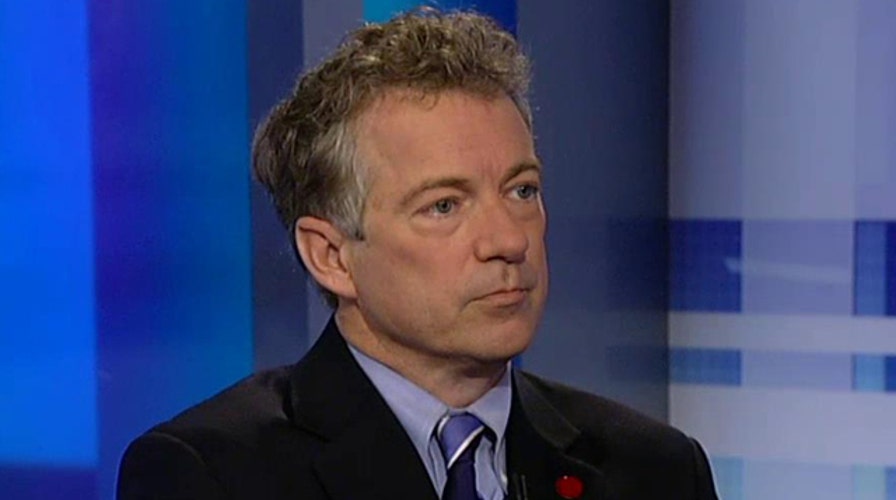What will be the GOP-led Congress' agenda?
Sen. Rand Paul on the new GOP-led Congress opportunities and goals and strategy for taking on Pres. Obama, his executive actions and ObamaCare
This is a rush transcript from "On the Record," January 5, 2015. This copy may not be in its final form and may be updated.
GRETA VAN SUSTEREN, FOX NEWS HOST: Senator Rand Paul joins us. It is his first interview of 2015, and the first of the new Congress.
Welcome back to Washington, sir.
SEN. RAND PAUL, R-KY: Glad to be with you, Greta.
VAN SUSTEREN: Will Republicans end gridlock and, if so, how?
PAUL: Absolutely. We are going to begin voting again. Part of the way it has to work in the Senate is you have to let the other party have votes. What happened the last several years is Harry Reid said no Republican amendments whatsoever. It is my way or the highway. Senator McConnell is saying I am going to let Democrats and Republicans have votes. It will take a while, but we will vote, vote, vote, and then we will pass legislation.
VAN SUSTEREN: Why is there not gridlock? As a hypothetical, you vote in the House and the Senate, because Republicans own both as of tomorrow. You vote to repeal ObamaCare, something that Republicans want to do. It then goes up to the president and he vetoes it. Now we're at a standstill again.
PAUL: Unless we come back say, well, now, we are going to repeal part of ObamaCare, are you going to veto that, too? There will be votes on total repeal that may or may not succeed, and votes on partial repeal, and votes on things we really want and maybe he won't agree to. But the only way to figure out the compromise, you have to have votes. If one side just puts what they want and nothing else, nothing ever gets accomplished. I think by putting bills forward, you will find out what the president will veto and what he won't and what the middle ground is.
VAN SUSTEREN: Suppose you vote to appeal ObamaCare. I don't think it will happen. But say the president went along with you. What in the world would happen?
(LAUGHTER)
What would happen to the American people? What would we have or not have?
PAUL: We could try freedom for a while. We had it for a long time. That's where you sell something and I agree to buy it because I like it. That is how we operate in most of rest of the marketplace other than health care. Now the president has said you can only buy certain types of health care that I approve of, and anything I don't approve of, you are not allowed to purchase. We could try freedom. I think it might work. It works everywhere else.
VAN SUSTEREN: When do we go back to the situation where some people simply couldn't afford health care with that? Right now, we are the healthier, more affluent people subsidizing the less healthy and affluent. They would end up back at the hospitals and the hospitals would be providing free care again and now we've got the financial burden back on the hospitals. So we're back to square one.
PAUL: The interesting thing is that they still do that. Even under Obamacare, there are people that get subsidized insurance. But that has a $6,000 deductible. What do you think they do with that $6,000 deductible? They are still a nonpayer.
But here's the thing, is nobody is talking about a time when the government does not participate at all. Even before ObamaCare, the government took care of the bottom 5 or 10 percent of the public who were on Medicaid. And then there is also charity. There are different ways that we take care and help the poor. Nobody is saying we would not still do those things if we didn't have ObamaCare. What ObamaCare did was take some of the things we did for the poor and expanded the government to basically the whole marketplace. That I think will ultimately bankrupt the country and then nobody will have good health care.
VAN SUSTEREN: Besides these issues of gridlock and Obamacare, the Palestinians, you intend to introduce a bill tomorrow, which is what?
PAUL: The Palestinian Authority gets money from the American taxpayer.
VAN SUSTEREN: And I should tell you in fiscal 2014, we researched it, $440 million.
PAUL: Yeah. So the Palestinian Authority gets $440 million presumably because they will peacefully interact with Israel, but the Palestinian Authority now has applied to be a part of the International Criminal Court and also said they want to investigate Israel's soldiers for war crimes. Well, that hardly seems to me a good idea to give American taxpayer money to a country or an entity that is now saying that an ally of ours, that their soldiers need to be investigated for war crimes.
VAN SUSTEREN: Are you going to win this or not? Will this pass or not in the U.S. Senate?
(CROSSTALK)
PAUL: I think there is a chance we could pass that. We will see what happens. I've introduced it before because I also do not think -- or a variation because I don't think American taxpayer money should go to a unity government that has Hamas and the Palestinian Authority together. It galls me to think that American taxpayer money could actually buy weapons that Hamas would be using against Israel. So I think there is a very good chance this could pass.
VAN SUSTEREN: Senator, nice to see you. I hope you come back often in the year 2015. Thank you, sir.
PAUL: Thank you. Thanks for having me.

